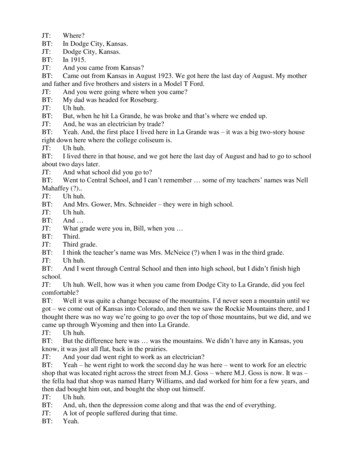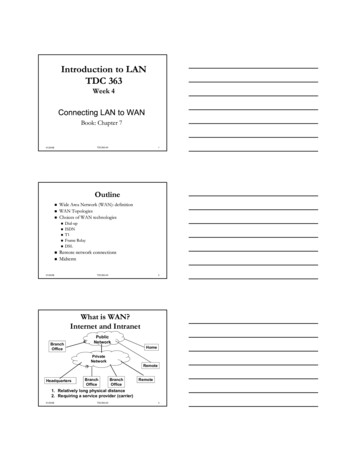
Transcription
JT:Where?BT: In Dodge City, Kansas.JT:Dodge City, Kansas.BT: In 1915.JT:And you came from Kansas?BT: Came out from Kansas in August 1923. We got here the last day of August. My motherand father and five brothers and sisters in a Model T Ford.JT:And you were going where when you came?BT: My dad was headed for Roseburg.JT:Uh huh.BT: But, when he hit La Grande, he was broke and that‟s where we ended up.JT:And, he was an electrician by trade?BT: Yeah. And, the first place I lived here in La Grande was – it was a big two-story houseright down here where the college coliseum is.JT:Uh huh.BT: I lived there in that house, and we got here the last day of August and had to go to schoolabout two days later.JT:And what school did you go to?BT: Went to Central School, and I can‟t remember some of my teachers‟ names was NellMahaffey (?).JT:Uh huh.BT: And Mrs. Gower, Mrs. Schneider – they were in high school.JT:Uh huh.BT: And JT:What grade were you in, Bill, when you BT: Third.JT:Third grade.BT: I think the teacher‟s name was Mrs. McNeice (?) when I was in the third grade.JT:Uh huh.BT: And I went through Central School and then into high school, but I didn‟t finish highschool.JT:Uh huh. Well, how was it when you came from Dodge City to La Grande, did you feelcomfortable?BT: Well it was quite a change because of the mountains. I‟d never seen a mountain until wegot – we come out of Kansas into Colorado, and then we saw the Rockie Mountains there, and Ithought there was no way we‟re going to go over the top of those mountains, but we did, and wecame up through Wyoming and then into La Grande.JT:Uh huh.BT: But the difference here was was the mountains. We didn‟t have any in Kansas, youknow, it was just all flat, back in the prairies.JT:And your dad went right to work as an electrician?BT: Yeah – he went right to work the second day he was here – went to work for an electricshop that was located right across the street from M.J. Goss – where M.J. Goss is now. It was –the fella had that shop was named Harry Williams, and dad worked for him for a few years, andthen dad bought him out, and bought the shop out himself.JT:Uh huh.BT: And, uh, then the depression come along and that was the end of everything.JT:A lot of people suffered during that time.BT: Yeah.
JT:While – while you were going to school, was there anything significant that happened?BT: Not – not really, other than just meeting new kids and stuff, you know, but we had – Iremember – we later lived on Cedar Street, Cedar and K, and this teacher, Nell MaHaffey, livedin a house behind us, but there was a big field out there, and then Deals (?) lived up on theSunset Drive – where Sunset Drive is that was just a big field, and Nell MaHaffey lived in ahouse in the center of that field. And, of course, she had - she had a niece that lived with her –June Deal, and she used to come by and holler at me to get – get ready to get to school, and Ididn‟t like that. The teacher lived too close to me. (laughter) She put me on her lap one day and I was messing around doing something, and she put me on her lap and says “I‟ve got to dustyour britches for you.” (laughter) Things like that, but other than that, just .JT:Then you did the normal things kids do growing up?BT: Yeah – yeah. Got into all kinds of problems and troubles (laughter)JT:You hunted and fished?BT: Yeah, we used to go up to Morgan Lake, you know, fishing. Walk up there and fish allday and then walk back with a whole tub full of perch, and Dad he‟d say “Just don‟t go back upthere and do that again.” He didn‟t want no more of them fish, but we just had – well in thosedays when we were kids and the depression come along, you didn‟t have anything, so we had tomake up our own stuff. We‟d sleigh ride in the winter, and we‟d go up here to Slaughter (?) Pondand ice skate in the winter time, and then you‟d just swim in the river.JT:Did you have – what they call “high banks”?BT: Yeah down the – high banks and the dump was right on the river down there.JT:That was above high banks?BT: Yeah, and we swam right below in the river – I don‟t know how we ever kept fromgetting typhoid fever and everything else, and then we had another one at the river – down at thepark, under the bridge.JT:Riverside Park?BT: Yeah – Riverside Park. We swam down there. That‟s where I learned to swim – mybrother threw me in and said “start swimming.” (laughter)JT:Well, when did you start learning to be an electrician?BT: My dad had a shop here – he came back. They moved to Portland in ‟39. He worked forthe Highway Department. When they built the shops – the old highway shops – he went to workin there – he wired that building as an electrician. Then when they got done, there was no workso he went to work for the highway shops, and he worked there for about 10 or 12 years, andthen he got transferred to Portland, and he went to work on the interstate bridge as an electriciandown there. And then in ‟45 he moved back here and started another shop. And he had a shop inthere just behind Zimmerman‟s on Fir Street, across the alley from Zimmerman‟s.JT:Where Doyle Zimmerman started the first BT: Yeah – his first store there, and I went to work for him there, but just as a helper. And Iworked for him, and JT:Was that an apprenticeship type?BT: Well, it was I just went in as a helper, and I worked for him for a couple of years andthen he moved back to Portland as times got tough again, and he went back to Portland. And,after that let‟s see before that I worked for Frank Clevinger (?).JT:Uh huh.BT: In the moving and storage.JT:Yeah – down where Connie‟s Storage is now.BT: Yeah, and worked with Jess Turnbull. Him and I worked together. He drove one truckand I drove the other truck. I worked for Frank for 3 or 4 years, and then I went to work for mydad after that. Well, after Frank sold out to Eppling (?), and I worked for Mr. Eppling – Gordon
Eppling when they had that for awhile. Then when they got out of there, I went to work – aftermy dad left in ‟45, oh about it – I know – it was ‟52 I went to work for Doyle Zimmerman.JT:Oh.BT: And I worked for Doyle for a couple years – worked with Eddie Hutson. We laid rugsand linoleum and tile, and worked on the planks (?) in the store. I worked for him, and then afterthat I went to work for Buckley, Buckley‟s Electric.JT:Yeah – I remember – down on Depot.BT: Yeah. I worked there, and than after Buckley sold out, Jim Maldonaldo‟s father-in-lawopened a shop here on the corner where – on the corner of Adams and Depot, across from RexallDrug.JT:Yeah.BT: And I went to work for him for a few years, and .JT:Now to get to work as an electrician, you had to take tests and .BT: Yeah, well I took my test for electrical – for the electrician journeyman test. I took thatfrom a fella that was an electrician in La Grande, Roy Rand (?) He was a – after he got over –out of his electrical work, well he went in as an electrical inspector, and I took an examinationfrom him in 1950, and Bob Munhall (?) and I took the – our two exams together, down in Roy‟sbasement one night, and passed the test and then in 19 – right after that I went to work for anelectrical construction out of Boise and wired the library at the college.JT:Uh huh.BT: When they built it – another fella and I – can‟t remem JT:Walter Pierce Library?BT: Yeah. I can‟t , but I had my journeyman card then, and after I got done there, let‟s seewhere‟d I go then. Oh, I went to work for Bohnenkamp – Bill Bohnenkamp. I worked for him fora couple of years, and then I worked for different contractors out of Portland, and I worked for –done a lot of work over at the college for a contractor – Watco Electric out of Portland, andEvergreen Electric out of – yeah Evergreen Electric in Portland. And I worked for ElectricalConstruction out of Portland, down on Y. I was down there for about a year rebuilding andrewiring that.JT:You and Mitch Jason (?)?BT: Yeah – Mitch Jason and I – we worked together quite a bit. And then we went over toHanford – Mitch and I. We were over there awhile when they – on that – the nuclear plant overthere, and then I came back here, and that‟s when I went to work for Bohnenkamp, I think. Iworked for Bohnenkamp and then after I got done at Bohnenkamps, I worked (a couple ofwords here I couldn‟t understand, and I went to work at the college.JT:Uh huh. Well, when you first went to work as an electrician, were they – had they phasedout (something tube ?)? Uh BT: Yeah – that was pretty well gone then. There was – you got into a lot of (something tube?) wiring from the old houses, but it was all phased out. It was all Romex cable. Yeah they doneaway with that.JT:Had – did they have, uh, ground at that time or the three wires – the two wires andground – did that come .BT: Yeah – that come after I went into it.JT:Uh huh.BT: We‟ve had 220, 110, 440 and all that – all three wire, and then we‟d have the 3-wiresingle phase – I mean 3-phase and 4-wire 3-phase, and different – all kinds of that stuff, and thenwhen Mitch and I came back from Hanford, we – Mr. Buckley called us. He got a contract atCentral School – when they built the Central School. He got a contract to wire that, and he calledus over from Hanford and said if you guys will come back and wire the school, I‟ve got all the
material and all you got – here‟s the blueprints – go up there and I‟ll leave you alone. So Mitchand I wired Central School.JT:Uh huh.BT: Then I went to work at the college as an electrician and later on as the maintenanceforeman. I retired there in ‟77 – July ‟77.BT: I went to the college in May 1959 „til ‟77.JT:What year did you move here on G Avenue?BT: Oh gee – ‟57, wasn‟t it. Yeah. August of ‟57 we moved here on G Avenue.JT:Our next door neighbors.BT: Huh?JT:As our next door neighbors.BT: Yeah.JT:You – you told me a little story about when you were going to school that ElridgeHuffman had said you was married .BT: Oh yeah.JT:What grade was that?BT: That was the first – that was the first – the freshman year in high school, wasn‟t it?(I think Mary was talking here in the background)BT: No I wasn‟t in . I wasn‟t in high school in your senior year.(more talking in the background from Mary)BT: No it was our freshman year when they made me sit with – you sit with me or me sitwith you (laughter)(more talking here from Mary)BT: I know when you‟d come into Elridge Huffman‟s room in the morning or to go to class,the first thing he‟d say “put that gum in the wastepaper basket” whether you had any gum or not.(laughter)JT:Well, it must have worked – you got married in what year?BT: 1935.JT:1935?BT: Mary graduated in ‟34, and we got married the next year – September 1935. We‟ve beenmarried almost 67 years.JT:That‟s a day or two.BT: Yeah. We got married and Mary was working for a Greek fellow that had a candy storedowntown by the Arcade Theater, the Liberty Theater. She was working there and I went up andpitched bundles – hauled bundles to the thrashing machine up at – in Ladd Canyon toStockhoff‟s place. I worked up there for two weeks and made 20.00, came back to town – wegot married. And, that‟s all we had was 20.00.JT:You once told me a story that you and Mary met Dallas McKinnon on the street and hesaid “I‟m going to Hollywood to be a movie star.”BT: Yeah – right. Yeah he was a nephew of Mrs. Burnett, or Birnie.JT:Mrs. Birnie?BT: Yeah.JT:Mrs. George Birnie?(Mary is talking here in the background, but I couldn‟t really make out what she was saying –something about him being dressed up.)BT: Yeah – he went to Hollywood.(More talking by Mary)JT:Yes - he came Cincinnati from Daniel Boone.BT: Yeah.
JT:And, other movies.BT: Yeah – he was in school with us here.JT:Well, you knew a celebrity.BT: Yeah (laughter) right.JT:All these years you went out and you hunted and fished.BT: Yeah – ever since I can remember. I started hunting elk in about 1937, right after I gotmarried, and I‟ve hunted them every year since. And fishing and stuff. Used to go down theSnake River quite a bit, up to Phillips quite a bit fishing.JT:What‟s the biggest changes locally that you can think of?BT: Oh, I think the college is one of the big changes that was made, because that‟s – overthere where the college is built, that‟s where I used to play all the time in that field, and whenthey built the college, well that JT:How big was the cemetery over at the college that they had to take when they startedbuilding it?BT: It was mostly on top of that hill up there. It wasn‟t as big as it is over here now, youknow, of course, but it – there was quite a few old holes left up there where they dug out thegraves and moved them, and when they were building the main – the first building at the college,the Administration Building, they dug up a lot of bones up there.JT:Do you remember any particular thing that – why they picked that spot for the college,and what was being said around town?BT: I, uh, I don‟t know why they picked that spot, but I know La Grande and Pendleton wereboth after that college, and La Grande somehow, I don‟t know why, they won out on it, and uhthey built it up on that hill, but JT:Possibly because of Walter Pierce being Governor at the time?BT: Could have been, yeah, and then where “H” Street is there, where the hill is, that was justa big gravel pit in there. There was no street there, and I remember we lived down on G Avenue,had a big red barn there, and they dug the basement up there with teams (?) and presnos (?) youknow, and there was glass and then they kept the horses down there in our barn at night.JT:Oh.BT: And us kids would always make it up there about 6 00 in the evening – they‟d get offwork to ride those horses back down – we‟d water „em in the creek there by Winn‟s place.JT:This was in 1929?BT: Clyde Winn . Yeah, and then they‟d keep the horses in our barn.JT:Uh huh.BT: We got to ride those horses all the time.JT:Well in those old days, there was quite an expanse between Old Town and New Town bythe railroa
JT: Uh huh. Well, how was it when you came from Dodge City to La Grande, did you feel comfortable? BT: Well it was quite a change because of the mountains. I‟d never seen a mountain until we got – we come out of Kansas into Colorado, and then we saw the Rockie Mountains there, and I











